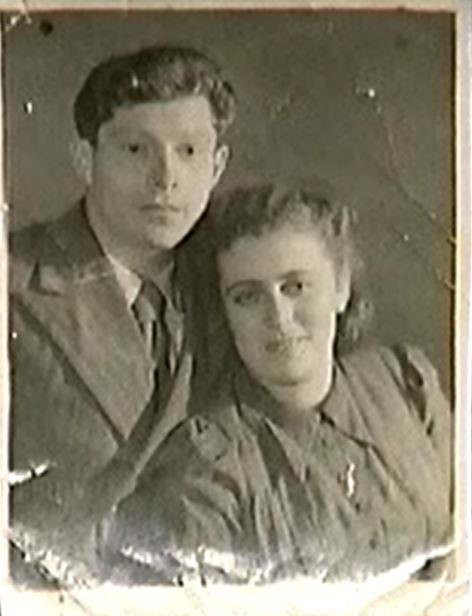Isaak Gurfinkel was born in 1921 in Poltava, central Ukraine. His father Mikhail was a barber, and Isaak followed in his footsteps, helping his father. The family was moderately religious; the father occasionally attended the synagogue, and he celebrated Passover and Rosh Hashana (the Jewish New Year), but did not observe the Sabbath. Isaak studied at a Yiddish school. In October 1940, he was drafted into the Red Army and sent to serve in the 566th Howitzer Artillery Regiment, which was deployed in the vicinity of Moscow.
On June 22, 1941, the Soviet-German War broke out, and on June 26 Isaak had his "baptism by fire" in eastern Belorussia. Although Gurfinkel's regiment enjoyed some sporadic successes, the army was retreating, and by July-August he was already fighting in western Russia. On October 13, 1941, during the Vyazma Operation, the 20th Army was decimated, and most of its surviving soldiers were taken prisoner by the Germans. Gurfinkel, too, found himself in captivity. Since he did not look stereotypically Jewish, he was not identified as such by his captors. During a march westward, Gurfinkel managed to escape from a column of POWs, and he exchanged his Red Army uniform for civilian clothing. Hoping to join the Soviet partisans, he moved southward, traveling through the forested areas of western Russia and northern Ukraine. In Romny, northeastern Ukraine, he witnessed the massacre of 1,200 local Jews by the Nazis on November 10. This experience shocked him deeply; he now realized that the Soviet reports about the Nazi anti-Jewish policies were not mere propaganda.1
Gurfinkel failed to find any Soviet partisans, and, after much wandering, he crossed the frontline near Kursk during the first days of 1942. He then ran into the forward units of the Red Army. At the first Special (counterintelligence) Department, Isaak was taken for a German spy and slated for execution by firing squad on the next day; thus, he had to escape from this Soviet army unit. After walking eastward for some twenty kilometers, he met another Soviet unit. The investigating officer of its Special Department asked him simply: "Do you want to fight?" Gurfinkel answered that he did, since he wished to avenge the murder of his brethren. After giving this answer, he was sent to Staryi Oskol, where a new artillery regiment was being formed.2 Interestingly enough, on two occasions during his subsequent service in 1942-43, his superiors (who were aware of his civilian profession) suggested that he serve as the regimental barber, but Gurfinkel refused both times, stating the he preferred to be actively involved in the fight against the enemy.
Gurfinkel's service with the regiment began with his being sent to an artillery school in Perm (northern Russia), along with a number of other soldiers, ostensibly in order to receive an officer's rank. However, Gurfinkel, like the rest of the cadets, did not receive such a rank, and, upon finishing the course, he was attached as a major sergeant (starshina) to the 141st Rifle Regiment of the 85th Rifle Division. The battalion to which he had been assigned was staffed by criminals who had been released from penal camps in exchange for a promise to fight the enemy. Gurfinkel was on good terms with them. He would later recall that, on more than one occasion, these former thieves and embezzlers told him that he could not possibly be a Jew, since he worked hard, side by side with the privates: digging caponiers for cannons, dragging the heavy guns from place to place, etc. In the winter of 1944, Gurfinkel's unit took part in lifting the siege of Leningrad (present-day St. Petersburg, Russia); this operation claimed the lives of most of the men in the battalion.
On May 17, 1944, Isaak Gurfinkel was seriously wounded. In the hospital, he narrowly avoided a leg amputation. In October 1944, he was discharged from the army, and settled in Kiev. His parents and sister, who had been evacuated in 1941, survived the war, and were reunited with him. For the next fifty-three years, he worked as a barber.
In the course of the war, Gurfinkel was awarded the Order of Glory, 3rd class, as well as some medals.
Isaak Gurfinkel never contemplated emigration, since he regarded himself as a Ukrainian patriot. He despised those Jews who had chosen to immigrate from the former Soviet Union to Germany. For all of his postwar life, he could not stand the sound of German speech.







